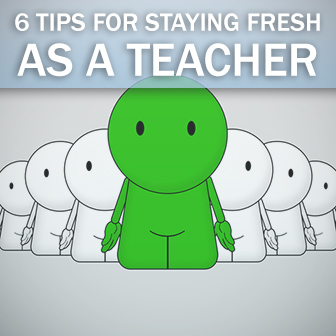Teaching is not the same today as it was even 10 years ago, much less four decades ago, which is when many of today's retiring teachers first entered the classroom as an instructor.
In the midst of changing educational practices, cultural norms, and ever increasing knowledge in subject areas, teachers need to stay on top of their methods and knowledge. There are plenty of methods to turn to for keeping teaching fresh.
How To Stay Fresh As a Teacher
-
1
Take Continuing Education Classes
Teachers can be students, too, and one of the best ways to stay fresh is to continue your education. Many teachers are required to earn a specific number of continuing education credits each year, but it's important to pick the right classes to take. Classes should expand the teacher's tool set rather than reviewing existing skills. Both online and traditional colleges offer continuing education diplomas and certificates. These programs take around one year complete, depending on the number of credit hours. A great way to find the best programs is asking colleagues what they have taken.
-
2
Revamp Lesson Plans
Teaching the exact same lessons every year can get stale, so take the time to revamp lesson plans on a regular basis. This is especially important for teachers who only teach one or two courses with multiple sections each day. After knowing the material so well and teaching it so many times, it's easy to get stuck in a rut. One useful exercise is to start from scratch on a lesson that has seemed to flop lately and rethink the best way to teach the material. Or, connect with a fellow teacher who may teach at a different school, and compare and improve on your current lesson plans!
-
3
Add Technology to Courses
Stanford professor noted recently is that technology is one of the best ways to connect with students these days. Many teachers have already made the switch from overhead projectors and blackboards to slideshow presentations, and laser pointers, but there's always more to add. Smart Boards help teachers create interactive lectures that students can access from their own computers later, and many teachers are finding ways to let students use their smartphones to vote on polls or collaborate on projects. Gamifying your lesson plan can also engage tech-driven students of modern-day as well.
-
4
Work Toward an Advanced Degree
Although most elementary, middle, and high school teachers don't need to hold a master's degree, many teachers still choose to work toward a higher degree, often a Master or Doctorate of Education. Doing so gives the teacher a chance to learn more about educational methods and specific subjects stay on top of things in the classroom. As The Weekly Herald points out, advanced degrees in education are particularly helpful to stay up-to-date with the latest teaching methods for kids growing up today. Plus, many school districts give a raise to teachers who hold an advanced degree.
-
5
Read Industry Books
There are thousands of books about education, and picking and choosing some of the best new books can provide a lot of food for thought. It's important to choose wisely, focusing on books that others are buzzing about or books about specific aspects of being a teacher that can motivate improvement in weak areas. Even memoirs from other teachers can give the sense of being part of a bigger movement and inspire excellence! Our picks are: The First Days of School: How to Be an Effective Teacher, The Creative Teacher: An Encyclopedia of Ideas to Energize Your Curriculum, Teaching with Love & Logic, and How to Differentiate Instruction in Mixed-Ability Classrooms.
-
6
Brainstorm with Other Educators
Colleagues are sometimes the best places to get ideas, particularly if they work at the same school or type of school. Picking someone else's brain can provide tons of ideas on how to incorporate new techniques to connect with the students and help them learn more effectively. It can also help refresh educators who are feeling burned out or discouraged, as teacher Jim Burke explained in his ASCD article.
Most teachers rely on all of these methods of continued education at some point during their career, but to find the one that's most important now, teachers should ask where they feel like they're falling behind.
Some teachers have lost passion for the subject, others feel like they can't connect with kids, and more feel like they’ve lost particular skills and expertise. Being selective in what methods used helps us take advantage of limited time.
Remember, you live and breathe education, so why not professionally advance yourself?
P.S. If you enjoyed this article, please help spread it by clicking one of those sharing buttons below. And if you are interested in more, you should follow our Facebook page where we share more about creative, non-boring ways to teach English.








